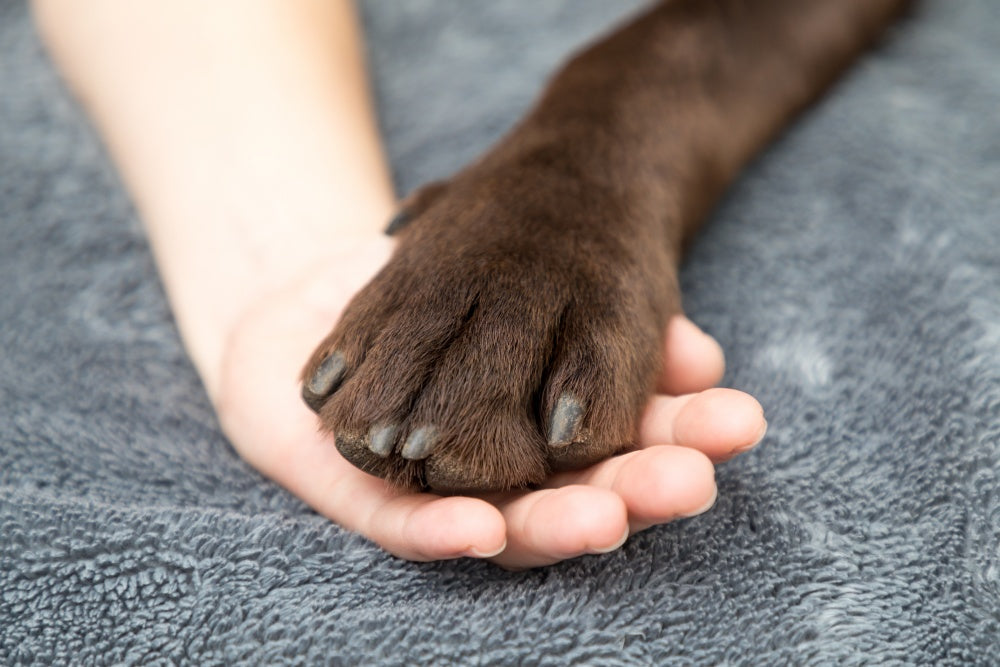Labrador Retriever 101: A Comprehensive Guide for New Pet Owners
Elizabeth Morey
Labrador Retrievers are one of the most popular dog breeds worldwide, known for their friendly nature, intelligence, and versatility. Whether you’re a first-time dog owner or adding another furry friend to your family, this comprehensive guide will help you understand what to expect and how to care for your new (or old) best friend.
Please note: while this article mainly addresses the characteristics of purebred Labrador retrievers, you'll find that much of the information here applies to lab mixes as well. Each individual dog is different, whether purebred or mixed, but for generalized information, you've come to the right place. We can't wait to get you better acquainted with your new best friend!
Quick Facts
- Personality: Friendly, energetic, and highly trainable
- Behavior: Social, loyal, and great with families
- Size and Breed Characteristics: Medium to large size; males 65-80 lbs, females 55-70 lbs
- Life span: 10-12 years
- Coat and Grooming: Short, dense coat; moderate shedding; easy to groom and adaptable to different climates
- Dietary Needs: High-quality diet; watch for obesity
- Exercise Requirements: High; needs daily physical and mental stimulation
- Health Concerns: Hip dysplasia, elbow dysplasia, and obesity
- Training Tips: Positive reinforcement; socialization is key
Personality and Behavior
Labradors are known for their outgoing and affectionate personalities. They are typically friendly with everyone they meet, including children, other pets, and strangers, although some are more territorial or protective of their families than others. This makes them excellent family pets and companions.
- Social Nature: Labradors thrive on social interaction and do best in environments where they can be part of family activities.
- Energy Levels: They are highly energetic dogs that require plenty of exercise to keep them happy and healthy.
- Intelligence and Trainability: Labradors are smart and eager to please, which makes them highly trainable. They excel in obedience training, agility, and even search and rescue missions. Positive reinforcement is key to their training.
Size and Breed Characteristics
Labradors are medium to large-sized dogs with a strong, athletic build. Here are some key characteristics to be aware of:
- Size: Male Labradors typically weigh between 65 to 80 pounds and stand about 22.5 to 24.5 inches tall at the shoulder. Females generally weigh between 55 to 70 pounds and stand about 21.5 to 23.5 inches tall.
- Build: Labradors have a sturdy, muscular build with a broad chest and strong legs, ideal for swimming and retrieving. American Labrador retrievers tend to have a more slender build and pointier noses, while the English variety is shorter and stockier, with shorter snouts.
- Head and Tail: Labradors have a broad head with kind, expressive eyes and a strong, powerful jaw. Their "otter" tail is thick at the base and tapers to a point, helping them navigate while swimming.
- Coat: Their short, dense coat is water-resistant, which makes them excellent swimmers. They come in three standard colors: black, yellow, and chocolate.
- Climate: Labradors do best in moderate climates but tolerate cold well due to their dense coat. Labs should be monitored for discomfort in hot or excessively cold temperatures and avoid exercising heavily in the heat.
Coat and Grooming
Labradors have a short, dense, double-layered coat that is water-resistant, making them great swimmers. Grooming a Labrador is relatively easy, but regular maintenance is necessary to keep their coat healthy.
- Shedding: Labradors shed moderately year-round, with a couple of heavier shedding periods during the spring and fall.
- Brushing: Brush your Labrador at least once a week to remove loose hair and reduce shedding. During shedding seasons, more frequent brushing may be needed.
- Bathing: Labradors do not require frequent baths; bathing every few months or as needed is sufficient.
- Nail Care: Regularly trim their nails to prevent overgrowth, which can cause discomfort and health issues.
Dietary Needs
Proper nutrition and portion control are crucial for maintaining your Labrador’s health and preventing obesity, a common issue in the breed.
- High-Quality Diet: Feed your Labrador a balanced, high-quality dog food that is based on meat-derived proteins and contains moderate amounts of healthy fats, complex carbs, minerals, and vitamins.
- Portion Control: Be mindful of portion sizes to prevent overeating. Labradors have a tendency to overeat if given the chance.
- Treats: Use treats sparingly, especially during training sessions, to avoid excessive calorie intake.
- Water: Ensure your Labrador has access to fresh water at all times.
Exercise Requirements
Labradors are active and energetic dogs that need plenty of exercise to stay healthy and happy.
- Daily Exercise: Aim for at least an hour of vigorous exercise daily. This can include walks, runs, and playtime. Labs love to fetch, swim, play tug-of-war, and more.
- Mental Stimulation: Provide mental stimulation through puzzle toys, training sessions, and interactive games.
- Socialization: Regular socialization with other dogs and people is important for their development and behavior.
Health Concerns
Labradors are generally healthy dogs, but they are prone to certain health conditions, the most common of which are listed here. Regular veterinary check-ups and preventive care are essential.
- Hip Dysplasia: A genetic condition where the hip joint doesn’t fit properly, leading to arthritis and discomfort.
- Elbow Dysplasia: Similar to hip dysplasia, this condition affects the elbow joints.
- Obesity: Labradors can easily become overweight, which can exacerbate other health issues.
- Ear Infections: Their floppy ears can trap moisture and debris, leading to infections. Regular ear cleaning is important.
- Regular Check-ups: Ensure regular vet visits to monitor and manage any health issues early on.
Training Tips
Training your lab from a young age will help them grow into well-behaved and well-adjusted adults.
- Positive Reinforcement: Use positive reinforcement techniques such as treats, praise, and play to encourage good behavior.
- Consistency: Be consistent with commands and routines to help your dog understand what is expected of them.
- Socialization: Expose your lab to different people, environments, and other animals to build their confidence and adaptability.
- Obedience Classes: Consider enrolling in obedience classes to reinforce training and social skills and give your dog mental stimulation.
- Patience: Labs have a long period of adolescence and often still act like puppies until they're about two years old. Patience is key to get your lab through their long adolescent stage and into an obedient adulthood.
Is a Labrador Right for You?
Labrador Retrievers are a great choice for most people, although we encourage you to reconsider adopting one if you lead a sedentary lifestyle, are very allergic to pet dander, or are unable to provide your dog with any of the basic needs outlined above. As with any dog, you should consider whether your lifestyle and goals are compatible with your pet's needs.
Adopting a Labrador Retriever is a rewarding experience filled with love, loyalty, and adventure. With the right care, training, and attention to their needs, your Labrador will be a joyful addition to your family. We wish you all the best on your journey with your new furry friend!
Enjoy every moment with your Labrador Retriever, and remember, they are not just pets but cherished members of the family. Happy pet parenting!











